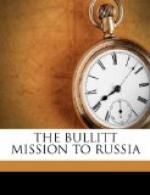a trap for the Allies. When the Bolshevists
first came into power, a breach was made with
the Capitalist Government on questions of principle,
but now they offered funds and concessions as
a basis for treating with them. He need not say
how valueless their promises were, but if they were
listened to, the Bolshevists would go back to
their people and say: “We offered
them great principles of justice and the Allies
would have nothing to do with us. Now we offer
money, and they are ready to make peace.”
He admitted his remarks did not offer a solution. The great misfortune was that the Allies were in need of a speedy solution. After four years of war, and the losses and sufferings they had incurred, their populations could stand no more. Russia also was in need of immediate peace. But its necessary evolution must take time. The signing of the world Peace could not await Russia’s final avatar. Had time been available, he would suggest waiting, for eventually sound men representing common-sense would come to the top. But when would that be? He could make no forecast. Therefore they must press for an early solution.
To sum up, had he been acting by himself, he would temporize and erect barriers to prevent Bolshevism from spreading. But he was not alone, and in the presence of his colleagues he felt compelled to make some concession, as it was essential that there should not be even the appearance of disagreement amongst them. The concession came easier after having heard President Wilson’s suggestions. He thought that they should make a very clear and convincing appeal to all reasonable peoples, emphatically stating that they did not wish in any way to interfere in the internal affairs of Russia, and especially that they had no intention of restoring Czardom. The object of the Allies being to hasten the creation of a strong Government, they proposed to call together representatives of all parties to a Conference. He would beg President Wilson to draft a paper, fully explaining the position of the Allies to the whole world, including the Russians and the Germans.
Mr. Lloyd George agreed
and gave notice that he wished to
withdraw his own motion
in favour of President Wilson’s.
Mr. Balfour said that he understood that all these people were to be asked on an equality. On these terms he thought the Bolshevists would refuse, and by their refusal, they would put themselves in a very bad position.
M. Sonnino said that he did not agree that the Bolshevists would not come. He thought they would be the first to come, because they would be eager to put themselves on an equality with the others. He would remind his colleagues that, before the Peace of Brest-Litovsk was signed, the Bolshevists promised all sorts of things, such as to refrain from propaganda, but since that peace had been concluded they had broken all their promises, their one idea being to spread




